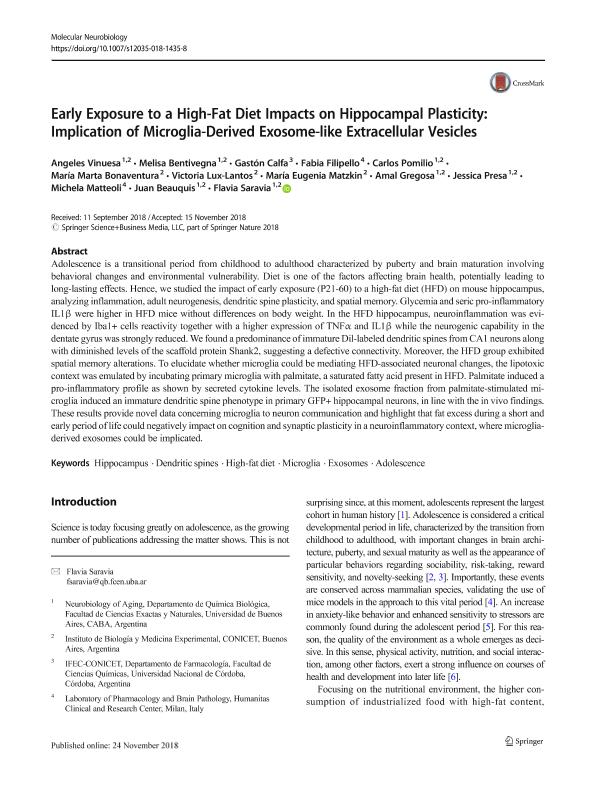Artículo
Early Exposure to a High-Fat Diet Impacts on Hippocampal Plasticity: Implication of Microglia-Derived Exosome-like Extracellular Vesicles
Vinuesa, María Angeles ; Bentivegna, Melisa Inés María
; Bentivegna, Melisa Inés María ; Calfa, Gaston Diego
; Calfa, Gaston Diego ; Filipello, Fabia; Pomilio, Carlos Javier
; Filipello, Fabia; Pomilio, Carlos Javier ; Bonaventura, Maria Marta
; Bonaventura, Maria Marta ; Lux, Victoria Adela R.
; Lux, Victoria Adela R. ; Matzkin, Maria Eugenia
; Matzkin, Maria Eugenia ; Gregosa Merlino, Amal Patricio; Presa, Jessica Lorena; Matteoli, Michela; Beauquis, Juan
; Gregosa Merlino, Amal Patricio; Presa, Jessica Lorena; Matteoli, Michela; Beauquis, Juan ; Saravia, Flavia Eugenia
; Saravia, Flavia Eugenia
 ; Bentivegna, Melisa Inés María
; Bentivegna, Melisa Inés María ; Calfa, Gaston Diego
; Calfa, Gaston Diego ; Filipello, Fabia; Pomilio, Carlos Javier
; Filipello, Fabia; Pomilio, Carlos Javier ; Bonaventura, Maria Marta
; Bonaventura, Maria Marta ; Lux, Victoria Adela R.
; Lux, Victoria Adela R. ; Matzkin, Maria Eugenia
; Matzkin, Maria Eugenia ; Gregosa Merlino, Amal Patricio; Presa, Jessica Lorena; Matteoli, Michela; Beauquis, Juan
; Gregosa Merlino, Amal Patricio; Presa, Jessica Lorena; Matteoli, Michela; Beauquis, Juan ; Saravia, Flavia Eugenia
; Saravia, Flavia Eugenia
Fecha de publicación:
24/11/2018
Editorial:
Humana Press
Revista:
Molecular Neurobiology
ISSN:
0893-7648
Idioma:
Inglés
Tipo de recurso:
Artículo publicado
Clasificación temática:
Resumen
Adolescence is a transitional period from childhood to adulthood characterized by puberty and brain maturation involving behavioral changes and environmental vulnerability. Diet is one of the factors affecting brain health, potentially leading to long-lasting effects. Hence, we studied the impact of early exposure (P21-60) to a high-fat diet (HFD) on mouse hippocampus, analyzing inflammation, adult neurogenesis, dendritic spine plasticity, and spatial memory. Glycemia and seric pro-inflammatory IL1β were higher in HFD mice without differences on body weight. In the HFD hippocampus, neuroinflammation was evidenced by Iba1+ cells reactivity together with a higher expression of TNFα and IL1β while the neurogenic capability in the dentate gyrus was strongly reduced. We found a predominance of immature Dil-labeled dendritic spines from CA1 neurons along with diminished levels of the scaffold protein Shank2, suggesting a defective connectivity. Moreover, the HFD group exhibited spatial memory alterations. To elucidate whether microglia could be mediating HFD-associated neuronal changes, the lipotoxic context was emulated by incubating primary microglia with palmitate, a saturated fatty acid present in HFD. Palmitate induced a pro-inflammatory profile as shown by secreted cytokine levels. The isolated exosome fraction from palmitate-stimulated microglia induced an immature dendritic spine phenotype in primary GFP+ hippocampal neurons, in line with the in vivo findings. These results provide novel data concerning microglia to neuron communication and highlight that fat excess during a short and early period of life could negatively impact on cognition and synaptic plasticity in a neuroinflammatory context, where microglia-derived exosomes could be implicated.
Palabras clave:
ADOLESCENCE
,
DENDRITIC SPINES
,
EXOSOMES
,
HIGH-FAT DIET
,
HIPPOCAMPUS
,
MICROGLIA
Archivos asociados
Licencia
Identificadores
Colecciones
Articulos(IBYME)
Articulos de INST.DE BIOLOGIA Y MEDICINA EXPERIMENTAL (I)
Articulos de INST.DE BIOLOGIA Y MEDICINA EXPERIMENTAL (I)
Articulos(IFEC)
Articulos de INST. DE FARMACOLOGIA EXPERIMENTAL DE CORDOBA
Articulos de INST. DE FARMACOLOGIA EXPERIMENTAL DE CORDOBA
Citación
Vinuesa, María Angeles; Bentivegna, Melisa Inés María; Calfa, Gaston Diego; Filipello, Fabia; Pomilio, Carlos Javier; et al.; Early Exposure to a High-Fat Diet Impacts on Hippocampal Plasticity: Implication of Microglia-Derived Exosome-like Extracellular Vesicles; Humana Press; Molecular Neurobiology; 56; 7; 24-11-2018; 5075-5094
Compartir
Altmétricas



